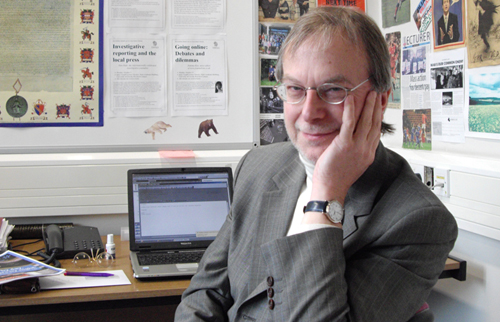The University ends up equal 12th in a league of 47 universities in the country.Most of the research outputs of academics in journalism and media production at the University of Lincoln are of international standing. The Linc’s Harry Lincoln talks with Richard Keeble, Professor of Journalism about the University’s recent success in the Research Assesment Excercise 2008.

Harry Lincoln: Tell us about the recent success of the journalism department in a major national research assessment exercise.
Richard Keeble: Well, we did amazingly well. Out of our submissions, 95 per cent were considered of international standard. That puts us equal 12th in a league of 47 universities providing media/communication courses. Since journalism was not even entered in the previous assessment exercise in 2001 – that’s quite a turnaround!
HL: Are you seeing a move into new areas of media research happening in 2009/2010?
RK: Yes, we are likely to gain a fair amount of money as a result of our success. We have a number of plans: to increase the number of PhD students (who will be able to help us out in teaching and thus release staff to do more research); to build up archives of eminent journalists for research purposes and to hold a series of conferences. We are starting a new MA in Journalism, War and International Human Rights in September which should have research spin-offs – we already have in place a DJ (Doctorate of Journalism) which we aim to develop.
HL: What would you personally like to see more of in research topics?
RK: I’m particularly keen to explore the areas of literary journalism, peace and war journalism and media ethics. I’m currently editing a text, Journalism, War and Conflict Resolution, with Professor John Tulloch, the Head of the LSJ, and Florian Zollmann, a PhD student in the School of Journalism. It draws together the work of more than 20 international scholars and campaigners – and so there is scope there for conferences and further research. I think future research may also involve colleagues from other disciplines: politics, PR and even fine art, for instance.
HL: Have the objectives/aims of 2006’s CEMPRE (Centre for the Study of Media Policy, Regulation and Ethics) research development projects been met? Are there revised plans for the future?
RK: CEMPRE members achieved remarkable successes in the RAE. Our publication rate is very impressive. Our range of interests is very diverse — taking in government media policy and regulation; the ethics of documentary, the ethics of the media coverage of torture and other human rights abuses; the ethics of tabloid journalism (particularly relating to its coverage of war); journalists’ self regulation and the role of the various media regulatory bodies; the history of journalism ethics – in both the UK, France and India; the formation of the journalist’s ethical imagination; employment of ethnic minority journalists in mainstream media; the ethics of investigative journalism and the news agenda of Black African press in the UK. I guess we now need to devote more time to applying to the research funding councils.
HL: It is stated in the University’s website that research gathered is presented to various government departments… Which departments and how does the relevant research help?
RK: My colleague, Professor Sylvia Harvey, in Media Production, has submitted evidence to the 2007 House of Commons Select Committee on Culture, Media and Sport; to Ofcom’s Second Review of Public Service Broadcasting, Phase One in June 2008; to Ofcom’s Second Review of Public Service Broadcasting in December 2008 and to Ofcom’s consultation on Citizenship: ‘Communicating Democracy’ in October 2008. Professor Harvey, a leading theorist in her field, is aiming to influence government policies in these areas.
HL: How is the research collected made accountable or ideally presented in a way that others can access it?
RK: Members of CEMPRE have published many books. I, for instance, have written or edited 13 texts – on subjects as diverse as communication ethics, practical journalism skills, literary journalism and the reporting of US/UK imperialism.
They have been translated in Chinese, Ukrainian and Romanian. All this helps distribute the results of research in accessible ways to an international audience. CEMPRE members also write regularly for the media and contribute papers to a range of academic journals such as Journalism, Journalism Studies and Ethical Space (which I edit). I also have a blog at www.medialens.org where I publish some of my research findings. My colleague John Tulloch has published articles on investigative journalism, the coverage of the rendition and torture scandals, tabloid press coverage of war, and various aspects of journalism ethics in leading journals in the field, including Journalism Studies and Journalism as well as Ethical Space. Other CEMPRE members, Jane Chapman, Sylvia Harvey, Brian Winston and Ola Ogunyemi, have also published extensively in our chosen areas.
